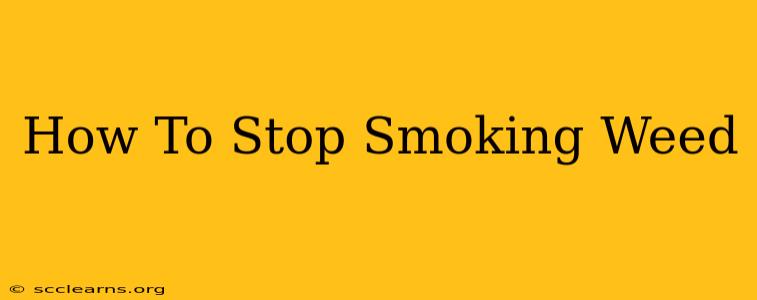Quitting weed, like quitting any addiction, is a challenging but achievable goal. Many people successfully overcome their cannabis dependence, and you can too. This guide provides practical steps and strategies to help you stop smoking weed and improve your overall well-being.
Understanding Your Weed Addiction
Before you embark on your quitting journey, it's crucial to understand the nature of your addiction. Are you physically dependent on cannabis, experiencing withdrawal symptoms like irritability, anxiety, or difficulty sleeping? Or is your dependence primarily psychological, driven by habit or emotional coping mechanisms? Understanding the root cause of your cannabis use will inform your quitting strategy.
Identifying Triggers and Patterns
Take some time to reflect on your cannabis use. When do you typically smoke weed? What situations, emotions, or people trigger your cravings? Identifying these triggers is critical to developing effective coping mechanisms. Keep a journal to track your usage, noting the time, location, your mood, and what triggered your desire to smoke. This self-awareness will help you anticipate and manage cravings.
Creating a Quitting Plan
A well-structured plan significantly increases your chances of success. This plan should be personalized to your specific needs and circumstances.
Setting Realistic Goals
Don't try to quit cold turkey unless you're confident you can handle the withdrawal symptoms. Consider a gradual reduction approach, slowly decreasing your consumption over several weeks or months. Setting smaller, achievable goals, rather than one overwhelming goal of complete abstinence, can maintain momentum and prevent feelings of failure. For example, you could aim to reduce your daily consumption by one joint per week.
Seeking Support
Quitting weed is often easier with support. This could involve:
- Therapy or Counseling: A therapist can help you identify underlying issues contributing to your cannabis use and develop healthy coping strategies. Cognitive Behavioral Therapy (CBT) is particularly effective in treating addiction.
- Support Groups: Connecting with others facing similar challenges can provide valuable encouragement and a sense of community. Sharing experiences and strategies can be incredibly helpful.
- Family and Friends: Let your loved ones know you're quitting and ask for their support. Having a strong support network is crucial during challenging moments.
Finding Healthy Alternatives
Replacing cannabis with healthy alternatives is vital. Identify activities that you enjoy and that can help you manage stress and cravings. This could include:
- Exercise: Physical activity releases endorphins, which have mood-boosting effects.
- Meditation or Mindfulness: These practices can help you manage stress and cravings.
- Hobbies: Engage in activities you find enjoyable and relaxing, such as reading, painting, or spending time in nature.
- Healthy Diet: Nourishing your body with healthy foods can improve your overall well-being and help manage withdrawal symptoms.
Managing Withdrawal Symptoms
Withdrawal symptoms vary from person to person, but common ones include:
- Irritability: Practice relaxation techniques like deep breathing or meditation.
- Anxiety: Engage in calming activities like yoga or listening to relaxing music.
- Difficulty Sleeping: Establish a regular sleep schedule and create a relaxing bedtime routine.
- Changes in Appetite: Focus on eating healthy, nutritious foods.
Important Note: If you experience severe withdrawal symptoms, consult a medical professional immediately. They can provide support and guidance to help you manage these symptoms safely and effectively.
Staying Committed to Your Goal
Quitting weed is a journey, not a destination. Expect setbacks and celebrate your successes. Remember why you decided to quit and focus on the positive changes you'll experience in your life.
Relapse Prevention
Develop a relapse prevention plan. This plan should include strategies for dealing with cravings and triggers. Identify potential high-risk situations and develop strategies to avoid them or cope with them effectively. Don't be discouraged by setbacks; view them as learning opportunities.
By following these steps and seeking appropriate support, you can successfully stop smoking weed and improve your quality of life. Remember, you are not alone, and help is available.

